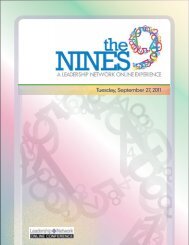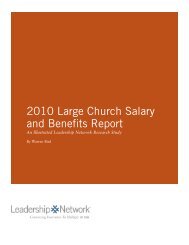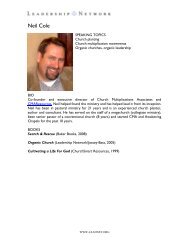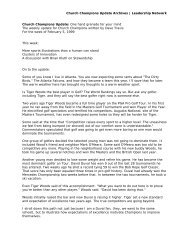ARE WE A PEOPLE AT HALF TIME? - Leadership Network
ARE WE A PEOPLE AT HALF TIME? - Leadership Network
ARE WE A PEOPLE AT HALF TIME? - Leadership Network
You also want an ePaper? Increase the reach of your titles
YUMPU automatically turns print PDFs into web optimized ePapers that Google loves.
A<br />
with<br />
LARRY CRABB, JR.<br />
NEXT: How do you build authentic<br />
community within<br />
the church<br />
Crabb: First of<br />
all, you have to make<br />
it your agenda. There<br />
is nothing tougher<br />
than building true<br />
community. If you set<br />
your sights on anything<br />
less, you will<br />
settle for some type<br />
of superficial community.<br />
Building true<br />
community is not a<br />
five-step program.<br />
You cannot pursue<br />
the usual goals of<br />
church structure—a<br />
certain size group, a certain set of programs,<br />
new facilities—and expect connection<br />
to simply happen.<br />
NEXT:So, with that understanding,<br />
what are the key issues in building<br />
authentic community<br />
Crabb: I believe there are two. The<br />
first is safety. Can people trust what is<br />
really happening in them to others Do<br />
we deeply care for each other because we<br />
know Christ is for us Churches are not<br />
typically safe places. We need to provide<br />
safety for every honest pursuit of God and<br />
be dangerously unsafe for all pretense<br />
and rebellion. An example...a woman told<br />
me that when she was 12 she came home<br />
from school and announced to her dad<br />
that she got a part in a school play. Her<br />
father’s immediate response was, “How<br />
did you do on your math test” He completely<br />
discounted her, did not hear her.<br />
These types of experiences made her feel<br />
unsafe because when she shared something<br />
that meant a lot to her, he did not<br />
care. She was making known something<br />
within her that reflected a legitimate<br />
hunger. It should have been affirmed. We<br />
need to make a real study of three kinds<br />
of relationships: (1) the kinds of relationships<br />
that diminish a person, (2) the<br />
kinds of relationships that heal and<br />
release the person God made us to be,<br />
and (3) the kinds of relationships that<br />
don’t do much of anything. Unfortunately,<br />
the latter is too common in our churches.<br />
Intentionality is such a key to the whole<br />
thing. It must be our agenda or else our<br />
relationships will be the third kind. When<br />
someone does have the courage to say<br />
something, we often fail to see what the<br />
Spirit wants to nourish and what He<br />
wants us to resist.<br />
NEXT:What is the<br />
other issue<br />
Crabb: If safety is<br />
the first issue, intentionality<br />
is the second.<br />
<strong>Leadership</strong> needs to<br />
know how to lead. Do we<br />
realize how terrified people<br />
really are People<br />
want to be deeply heard,<br />
not diminished. That<br />
includes facing what is<br />
truly ugly and bad in<br />
someone. We don’t want<br />
to hear spiritual platitudes.<br />
Small group leaders<br />
and pastoral staff need to build<br />
community that connects. Think hard<br />
about what kinds of relationships do damage,<br />
cause pain and increase the terror,<br />
and what kinds relieve the terror, release<br />
the work God is doing in them and honor<br />
the person God wants them to be.<br />
Most of us don’t pay close attention to<br />
how we impact others. Questions to consider<br />
are: ‘Do I make the same (or similar)<br />
impact Christ would make’, ‘If we<br />
want to build a healing community, what<br />
needs to be healed’ The biggest obstacle<br />
to building healthy community is a profound<br />
sense of inadequacy. We don’t know<br />
what to do when someone shares something<br />
meaningful, so we back away and<br />
encourage only shallow communication.<br />
NEXT:Once you recognize these two<br />
issues, how do you move to the next step<br />
Crabb: I have a simple model I call<br />
‘Enter, See and Touch’. If we are to build<br />
authenticity in groups, we must be able<br />
to enter each others’ lives.<br />
Next, we need to know what we are looking<br />
for, what we can see in another’s soul.<br />
We need to be able to recognize two key<br />
elements in ourselves and others: (1)<br />
people are incredibly thirsty for some<br />
kind of relational contact that gives them<br />
a legitimate sense of belonging, and (2)<br />
people protect themselves in all sorts of<br />
0 23<br />
ways from being seen. We fear scorn,<br />
rejection, criticism. As a result, we lack<br />
the courage to open up and be healed. We<br />
long for the relationships that our defensive<br />
maneuverings sabotage.<br />
Once you enter someone’s story and have<br />
the courage to say, “I want to know you, I<br />
have time to hear your story” and, as we<br />
see more clearly both the hunger for love<br />
and the fear that it doesn’t exist, then we<br />
must know what it means to touch someone,<br />
to dispense grace. We need to communicate<br />
what is deeply stirring in us<br />
that represents the reality of Christ, and<br />
simply give it. When I’m walking in fellowship<br />
with Christ, as my faith is burnished<br />
through suffering, as practicing<br />
spiritual disciplines enables me to hear<br />
the voice of God’s Spirit, then something<br />
is alive within me, that when given, can<br />
make a difference. The key to community<br />
is to be real in the presence of grace, to<br />
own what’s painful and ugly in the confidence<br />
that God has placed something<br />
better in all His children. ◆<br />
Con.NEXT.ion<br />
Dr. Larry Crabb, Jr.<br />
A Distinguished Scholar in Residence at<br />
Colorado Christian University, Dr. Crabb<br />
is recognized nationally for his books<br />
and seminars designed to strengthen<br />
Christians in their personal walk and<br />
relationships. Dr. Crabb has authored 14<br />
books and numerous articles. He is affiliated<br />
with Foothills Bible Church in<br />
Littleton, Colorado where he occasionally<br />
teaches and preaches.<br />
phone 303.730.7172<br />
fax 303.730.7270<br />
e-mail 103034.257@compuserve.com<br />
website www.larrycrabb-ibc.com<br />
Recommended READINGS from<br />
Larry Crabb:<br />
Inside Out<br />
NavPress<br />
To order, call 800.366.7788<br />
$12.00 (softback)<br />
1988 (Revised 10th anniversary edition)<br />
Connecting<br />
Word<br />
To order, call 800.251.4000<br />
$19.99 (hardback)<br />
1997







